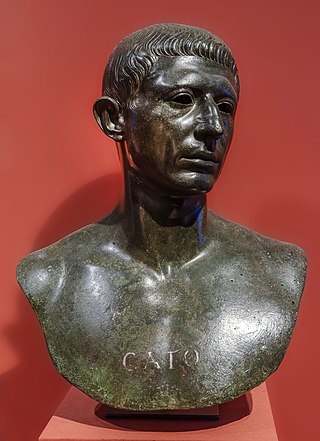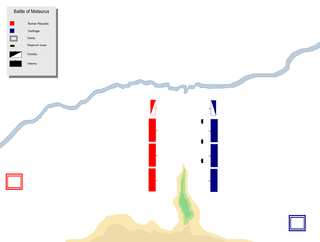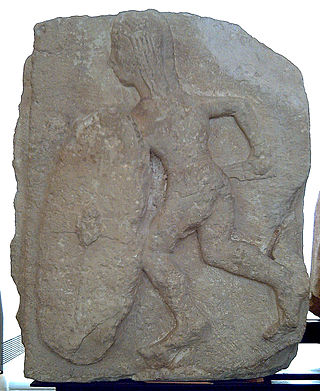80s BC is the time period from 89 BC – 80 BC.

Year 42 BC was either a common year starting on Monday, Tuesday or Wednesday or a leap year starting on Tuesday of the Julian calendar and a common year starting on Tuesday of the Proleptic Julian calendar. At the time, it was known as the Year of the Consulship of Lepidus and Plancus. The denomination 42 BC for this year has been used since the early medieval period, when the Anno Domini calendar era became the prevalent method in Europe for naming years.

Year 89 BC was a year of the pre-Julian Roman calendar. At the time it was known as the Year of the Consulship of Strabo and Cato and the Fourth Year of Zhenghe. The denomination 89 BC for this year has been used since the early medieval period, when the Anno Domini calendar era became the prevalent method in Europe for naming years.
Year 195 BC was a year of the pre-Julian Roman calendar. At the time it was known as the Year of the Consulship of Flaccus and Cato. The denomination 195 BC for this year has been used since the early medieval period, when the Anno Domini calendar era became the prevalent method in Europe for naming years.

Marcus Porcius Cato, also known as Cato the Censor, the Elder and the Wise, was a Roman soldier, senator, and historian known for his conservatism and opposition to Hellenization. He was the first to write history in Latin with his Origines, a now fragmentary work on the history of Rome. His work De agri cultura, a rambling work on agriculture, farming, rituals, and recipes, is the oldest extant prose written in the Latin language. His epithet "Elder" distinguishes him from his great-grandson Cato the Younger, who opposed Julius Caesar.
Cato typically refers to either Cato the Elder or Cato the Younger, both of the Porcii Catones family of Rome.

Lucius Aemilius Paullus Macedonicus was a two-time consul of the Roman Republic and general, who conquered Macedon in the Third Macedonian War.

Marcus Porcius CatoUticensis, also known as Cato the Younger, was an influential conservative Roman senator during the late Republic. His conservative principles were focused on the preservation of what he saw as old Roman values in decline. A noted orator and a follower of Stoicism, his scrupulous honesty and professed respect for tradition gave him a political following which he mobilised against powerful generals of his day, including Julius Caesar and Pompey.
Gnaeus Pompeius Strabo was a Roman general and politician, who served as consul in 89 BC. He is often referred to in English as Pompey Strabo, to distinguish him from his son, the famous Pompey the Great, or from Strabo the geographer.

The Battle of the Metaurus was a pivotal battle in the Second Punic War between Rome and Carthage, fought in 207 BC near the Metauro River in Italy. The Carthaginians were led by Hasdrubal Barca, brother of Hannibal, who was to have brought siege equipment and reinforcements for Hannibal. The Roman armies were led by the consuls Marcus Livius, who was later nicknamed the Salinator, and Gaius Claudius Nero.

The Battle of Thermopylae took place on 24 April 191 BC. It was fought as part of the Roman–Seleucid War, pitting forces of the Roman Republic led by the consul Manius Acilius Glabrio against a Seleucid-Aetolian army of Antiochus III the Great.
Marcus Porcius M. f. M. n. Cato Salonianus was the younger son of Cato the Elder, and grandfather of Marcus Porcius Cato Uticensis, also known as "Cato the Younger".
Marcus Porcius Cato, son of Cato the Younger by his first marriage to Atilia, was a Roman soldier and in his earlier years spent some time in politics with his father. Although he never achieved greatness, he was admired by close friends and relatives, and also served his father most loyally and shared his ideals. Marcus was renowned for being a man of gallantry and warm temperament.
Atilia was the first wife of Marcus Porcius Cato Uticensis and mother of his two eldest children.
Salonia was a Roman slave, and later freedwoman who lived during the mid-2nd century BC, and who was the second wife of Cato the Elder. She was the young daughter of the slave Salonius who was an under-secretary to Cato the Elder. Following the death of his first wife, Cato began taking solace with a slave girl who secretly visited his bed.

The gens Porcia, rarely written Portia, was a plebeian family at Ancient Rome. Its members first appear in history during the third century BC. The first of the gens to achieve the consulship was Marcus Porcius Cato in 195 BC, and from then until imperial times, the Porcii regularly occupied the highest offices of the Roman state.

Centurion is a historical fiction novel (ISBN 0755327764) written by Simon Scarrow, published by Headline Book Publishing in 2007. It is book 8 in the Eagles of the Empire series, continuing Macro and Cato's adventures in the eastern provinces of the Roman Empire that began in The Eagle in the Sand.

Lucius Porcius Cato was a Roman general and politician who became consul in 89 BC alongside Gnaeus Pompeius Strabo. He died at the Battle of Fucine Lake, possibly at the hands of Gaius Marius the Younger.
Marcus Porcius Cato was a member of the Roman plebeian gens Porcii and consul in 118 BC.

The Iberian revolt was a rebellion of the Iberian peoples of the provinces Citerior and Ulterior, created shortly before in Hispania by the Roman state to regularize the government of these territories, against that Roman domination in the 2nd century BC.











